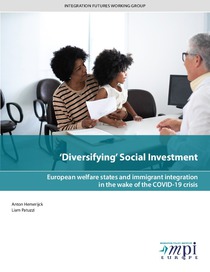‘Diversifying' social investment: European welfare states and immigrant integration in the wake of the COVID-19 crisis

Hemerijck, Anton ; Patuzzi, Liam
Migration Policy Institute, Brussels
2021
27 p.
epidemic disease ; education ; welfare state ; migration ; social policy ; employment
Social protection
https://www.migrationpolicy.org/
English
"Across Europe, the COVID-19 pandemic has strengthened awareness of the importance of robust, well-functioning welfare states in helping individuals, families, and communities weather threats to their lives and livelihoods. Initial EU and Member State responses to the pandemic and its economic fallout were much more vigorous than responses to other recent economic shocks, such as the Great Recession and the European debt crisis. Even so, European societies will likely have to contend with long-term social and economic impacts, which in many cases are exacerbating existing inequalities.
The shift in the structure and goals of welfare spending since the start of the pandemic can be understood through the prism of “social investment.” In recent decades, European welfare states have moved away from a predominantly reactive focus on financial safety nets that protect individuals during periods of unemployment and illness, and toward investing in people's human capital and employability to help them navigate life transitions and drive growth in advanced knowledge economies. Looking ahead, the success of social-investment policies will depend on their ability to account for immigration and diversity, increasingly prominent features of European societies that are central to understanding the nature and development of socioeconomic inequalities.
This report explores whether the social-investment approach to welfare states could serve as a tool for post-pandemic recovery—particularly in diverse, immigrant-receiving societies. It examines how European welfare systems fared and adapted during the Great Recession, how social investment seeks to balance social and economic goals, and how lessons from recent immigrant integration policy developments could help improve the reach, accessibility, and relevance of social-investment initiatives."
Digital
The ETUI is co-funded by the European Union. Views and opinions expressed are however those of the author(s) only and do not necessarily reflect those of the European Union or the ETUI.